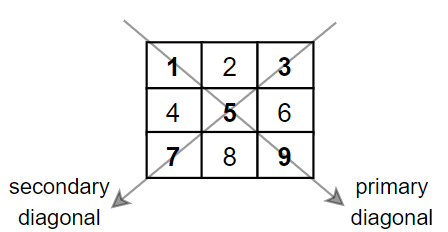Given a square matrix mat, return the sum of the matrix diagonals.
Only include the sum of all the elements on the primary diagonal and all the elements on the secondary diagonal that are not part of the primary diagonal.
Example 1:
Input: mat = [[1,2,3], [4,5,6], [7,8,9]] Output: 25 Explanation: Diagonals sum: 1 + 5 + 9 + 3 + 7 = 25 Notice that element mat[1][1] = 5 is counted only once.
Example 2:
Input: mat = [[1,1,1,1], [1,1,1,1], [1,1,1,1], [1,1,1,1]] Output: 8
Example 3:
Input: mat = [[5]] Output: 5
Constraints:
n == mat.length == mat[i].length1 <= n <= 1001 <= mat[i][j] <= 100
class Solution:
def diagonalSum(self, mat: List[List[int]]) -> int:
n = len(mat)
res = 0
for i in range(n):
res += mat[i][i] + (0 if n - i - 1 == i else mat[i][n - i - 1])
return resclass Solution {
public int diagonalSum(int[][] mat) {
int n = mat.length;
int res = 0;
for (int i = 0; i < n; ++i) {
res += mat[i][i] + (n - i - 1 == i ? 0 : mat[i][n - i - 1]);
}
return res;
}
}function diagonalSum(mat: number[][]): number {
let n = mat.length;
let ans = 0;
for (let i = 0; i < n; i++) {
ans += mat[i][i];
let j = n - 1 - i;
if (i != j) {
ans += mat[i][j];
}
}
return ans;
}class Solution {
public:
int diagonalSum(vector<vector<int>>& mat) {
int n = mat.size();
int res = 0;
for (int i = 0; i < n; ++i) {
res += mat[i][i] + (n - i - 1 == i ? 0 : mat[i][n - i - 1]);
}
return res;
}
};func diagonalSum(mat [][]int) int {
n, res := len(mat), 0
for i := 0; i < n; i++ {
res += mat[i][i]
if n-i-1 != i {
res += mat[i][n-i-1]
}
}
return res
}impl Solution {
pub fn diagonal_sum(mat: Vec<Vec<i32>>) -> i32 {
let n = mat.len();
let mut res = 0;
for i in 0..n {
res += mat[i][i] + mat[n - i - 1][i];
}
if n & 1 == 1 {
return res - mat[n / 2][n / 2];
}
res
}
}
